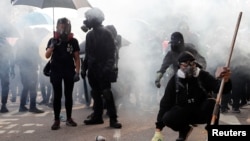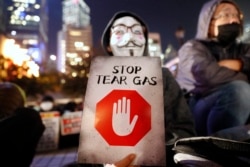Hong Kong police have used more than 10,000 canisters of tear gas to answer unrest across the territory over the past six months.
Government critics are demanding fully democratic elections and an investigation of police officers’ use of force, including tear gas. Its repeated use has caused many people to worry about its effects on their health.
There is no evidence linking tear gas to long-term health problems. But some observers believe there has never been a situation in which so much tear gas has been used over such a long period of time.
Alistair Hay is a toxicologist from the University of Leeds in England. He says he cannot think of a place “were there has been this level of repeated exposure for people to tear gas.” He noted that what is happening in Hong Kong has probably never happened before.
Hay said large amounts of CS gas, which is often used to make tear gas, could remain in the environment for a long time, causing problems for people in poor health.
Hong Kong police have used tear gas in some neighborhoods, near schools, stores and even hospitals. The gas has not only affected protesters but also children, old people and the sick.
Some people are concerned that gas residue could stick for days or even weeks to roads, walls and other places. Parents, schools and community groups have called on police to say what is in the gas. But police have yet to release that information.
Many seek informal treatments
Many Hong Kongers are looking for answers. Some people are now using baking soda to wash clothes, clean and bathe with.
Protesters are telling each other not to take warm baths because the hot water opens pores in the skin and causes the chemicals to enter the body.
In one kitchen that normally manufactures food snacks, volunteers make kits for fighting the effects of tear gas. They are combining herbs and other natural ingredients to create treatments for clearing the body of toxic substances.
The Associated Press spoke with the kitchen’s owner, who asked not to be identified. “Police have used so much tear gas and people are suffering,” she said.
The kits include pills containing vitamins and turmeric. The treatment also includes 10 bottles of a drink that is said to support the body’s natural defenses against disease. It also comes with directions for a 10-day, detoxification program that includes no alcohol or smoking.
The substances have not been scientifically tested, but the kitchen’s owner said that protesters have said good things about the mixtures.
One informal study by a group of doctors found that, among 170 reporters following the protests, most said they had difficulty breathing. Hong Kong media said that most of the reporters coughed a lot, with some even expelling blood. They also reported skin and stomach problems.
People living in Hong Kong are fearful that the tear gas could somehow produce dioxin, a substance linked to disease.
Poison expert Alistair Hay said he did not know of any cases in which tear gas could produce dioxin. But he added it is possible if the canister burns at temperatures over 250 degrees Celsius.
Hong Kong government officials have said that any toxic substances could come from fires set by protesters.
More than 1,000 tear gas canisters were fired in a single day at the Chinese University of Hong Kong last month. The school has asked a laboratory to test air, water and soil in the area. Early results showed no harmful substances.
Still, a high school near the university hired experts to clean the grounds of possibly harmful materials for safety reasons.
I’m Mario Ritter Jr.
Mario Ritter Jr. adapted this Associated Press story for VOA Learning English. George Grow was the editor.
_______________________________________________________________
Words in This Story
canister – n. a container for holding a special object or substance
toxicologist – n. someone who studies poisonous or toxic substances
residue – n. a small amount of a substance that remains after most of it has been removed
pore – n. a small opening in the skin
ingredient – n. one of the things that make up a food or similar mixture
cough – v. to expel air from the lungs with a sudden, sharp sound






